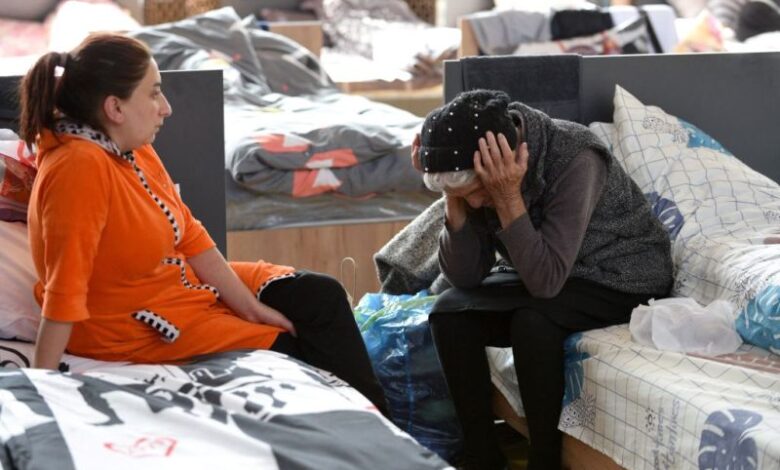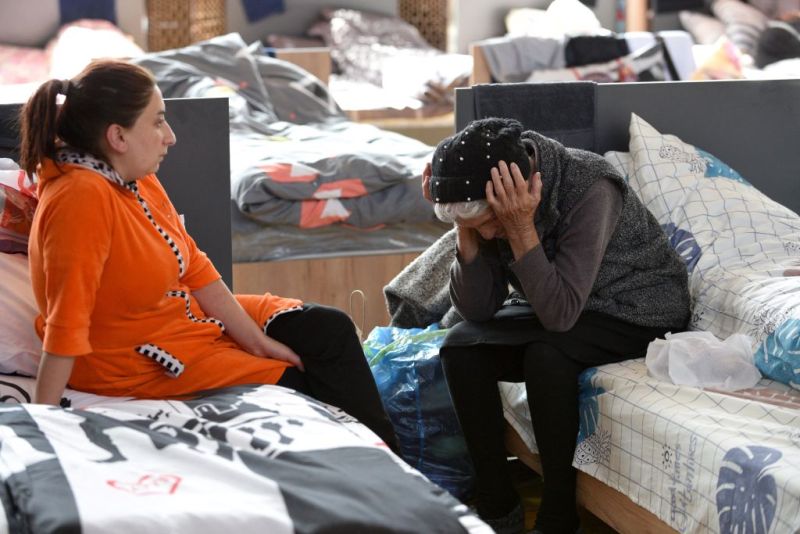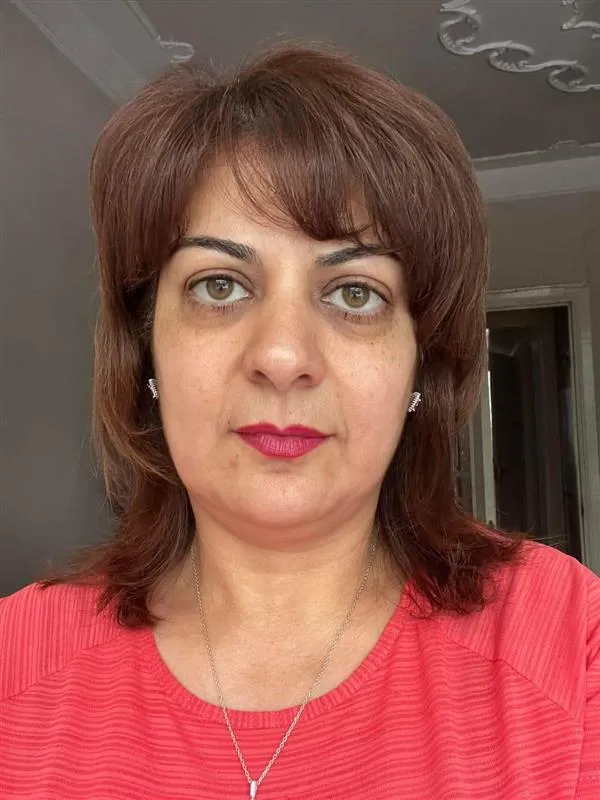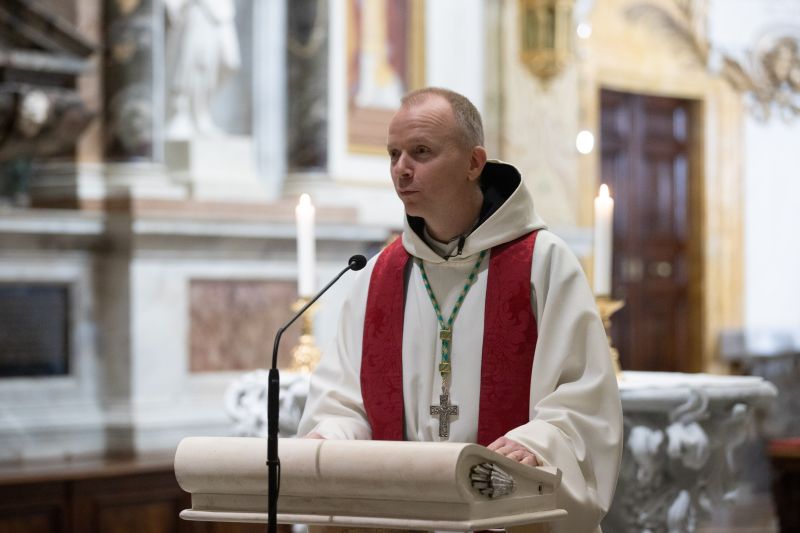‘Sadness in our hearts’: Armenian Christian recounts family’s escape from Nagorno-Karabakh

 Anya Safaryan (right), 78, who fled from Azerbaijan's controlled region of Nagorno-Karabakh, sits on a bed at a sports complex set up as a temporary shelter in the Armenian city of Artashat on Oct. 8, 2023. / Credit: Karen Minasyan/AFP via Getty Images
Anya Safaryan (right), 78, who fled from Azerbaijan's controlled region of Nagorno-Karabakh, sits on a bed at a sports complex set up as a temporary shelter in the Armenian city of Artashat on Oct. 8, 2023. / Credit: Karen Minasyan/AFP via Getty Images Washington, D.C. Newsroom, Nov 4, 2023 / 07:00 am (CNA).
The little-known but decadeslong conflict between Armenia and Azerbaijan erupted anew on Sept. 19, resulting in hundreds killed and a massive refugee crisis from the contested enclave of Nagorno-Karabakh.
Lyudmila Melquomyan, 47, who is among the more than 100,000 Christian Armenians who fled their ancestral homeland after Azerbaijian launched an offensive, recently shared her harrowing experiences with CNA.
“Nobody wants to leave his homeland, but we had to in order to save the lives of our children, to protect them from war, starvation, and further atrocities of Azeris,” Melquomyan told CNA.
Melquomyan was born in the city of Hadrut and had lived in Nagorno-Karabakh her entire life until last month when, she said, “the whole population was forced to leave, escaping the genocide of Azerbaijan.”
What is happening?
The crisis centers on the region of Nagorno-Karabakh, also known by its ancient name of Artsakh. Though internationally recognized as part of Azerbaijan, Nagorno-Karabakh was primarily made up of Armenian Christians who claimed self-sovereignty under the auspices of the “Republic of Artsakh.”
Their bid for independence came to an abrupt end, however, when the Azeri government launched a short but intense military campaign on Sept. 19. The assault ended with more than 200 Armenians dead and a mass exodus out of Nagorno-Karabakh.
Azerbaijan launched its offensive on Nagorno-Karabakh after a more than nine-month-long blockade of the region in which the delivery of all food, medical supplies, fuel, and humanitarian aid were severely restricted. By the time Azeri forces moved to wrest control of the region, the Armenians in Nagorno-Karabakh were already critically low on food, supplies, and necessities like electricity and heating.
On the morning of Sept. 19, “when all the people were at offices and children at schools,” Melquomyan said, the Azeri military began launching artillery and mortar strikes on both military and civilian positions.
“When the missiles were being fired my 17-year-old daughter was awfully scared and began to cry,” Melquomyan said. “My younger son behaved like a brave man; he didn’t show his fear. As for me, I was afraid for my kids’ lives, not for me.”

Melquomyan feared especially for the life of her eldest son, who was a soldier in the Artsakh military.
The breakaway region’s Artsakh Defense Forces fought back, but vastly outgunned and without any outside support, the Armenians were forced to surrender just one day after the start of the offensive.
“Our hungry but brave soldiers fought as much as they could,” she explained, “but without armament, without [the] support of Armenia, left alone … many people were killed or injured, even civilians.”
According to Melquomyan, many Artsakhis, including a 15-year-old relative of her husband’s, are still missing.
Though the Azeri government promised to integrate ethnic Armenians into the country, widespread fears of more violence, reprisals, and religious and cultural persecution led to a massive exodus.
In the days that followed, videos on social media showed miles-long lines of cars filled with Armenians attempting to leave their homeland to escape Azeri rule.
Melquomyan said that people began fleeing just five days after the Azeri offensive, on Sept. 24.
With her family, Melquomyan also fled, leaving her home for the very last time at noon on Sept. 25.
“It was a terrible way with long miles [of] traffic jam, without food and water, sadness in our hearts, tears, homesickness,” she said.
Though the journey to Armenia proper would typically take only six hours, Melquomyan said that it took her family some 36 hours to get out. All the while, she feared that somewhere along the way Azeri authorities would stop and arrest them.
“When driving out of Artsakh I was also afraid that they would stop and arrest my eldest son (he was driving the car) and maybe me too,” she explained. “My daughter was terribly scared and pale, she was always saying: ‘It’s hot, open the window,’ though it was quite cool in the car, she was short of air.”
While over 100,000 Artsakhis successfully escaped into Armenia, not everyone was able to get out. The Azeri government has arrested several high-ranking Artsakh officials and at least one Artsakhi civilian, charging them with war crimes and treason.
Additionally, some 68 Armenians, including women and children, were killed and hundreds more were injured when a gasoline tank exploded beside the highway leading out of Nagorno-Karabakh’s capital city, Stepanakert.
Rebuilding a new life
Though she was able to escape, her new life in Yerevan, Armenia’s capital city, has not been easy. Far from her ancestral homeland, she and her family must now struggle just to survive and to rebuild their lives. It’s a common struggle that all the Artsakhi refugees share.
“One of the problems is too high [a] renting price, the other one is unemployment,” she said.
Though she said that the Armenian government and aid groups are attempting to help by supplying food and household and hygiene items, many are still struggling to get by. Moreover, the physical and emotional scars that many Artsakhi refugees now bear will last for the rest of their lives.
A people deeply rooted in tradition, perhaps the greatest struggle of all is being separated from the land of their parents and forebears.
“We left the graves of our parents, children, brothers, and sisters,” Melquomyan mourned.
Both her mother and brother were buried in Hadrut. By the time her father died in 2022, however, Hadrut had already been occupied by Azeri forces.
“We had to bury him not far from Stepanakert,” she said, “but he asked me so much before dying to bury him in our native Hadrut.”
Despite everything, Melquomyan said that “each citizen of Artsakh hopes to return someday.”
Armenia in crisis
Though the battle for Nagorno-Karabakh has ended in a devastating defeat for the Armenians, many fear that Armenia itself may also be in danger of invasion.
Wedged between Azerbaijan and the region’s major power, Turkey, Armenia sits much like an island in a sea of enemies who are ethnically, religiously, and ideologically opposed to it.
Robert Nicholson, president of the Christian advocacy group the Philos Project, told CNA that “at this point, an invasion by Azerbaijan into southern Armenia is very possible.”
Armenia and Azerbaijan have participated in several peace talks and Armenian Prime Minister Nikol Pashinyan said last week that they were nearing a peace agreement. However, the two countries continue to engage in clashes at their border.
Nicholson said that at this time “it is hard to imagine Azerbaijan signing a peace agreement.”
According to Nicholson, Azeri President Ilham Aliyev and Turkish President Recep Erdoğan have been “very open” that they “would like to seize southern Armenia” as part of a plan to “reassert Turkic-Islamic international supremacy.”
Armenia’s southern Syunik province, Nicholson explained, is the “only stretch of land that stands in the way of the pan-Turkic dream of a contiguous, Turkic federation stretching from Istanbul to Central Asia.”
“Aliyev has openly discussed his desire to take further territory,” Nicholson explained. “He recently instructed government officials to start assigning Azeri names to cities in Armenia, and a joint conference was recently held with Turkey to promote the revisionist idea that Azerbaijan has a historical claim over Armenia.”





